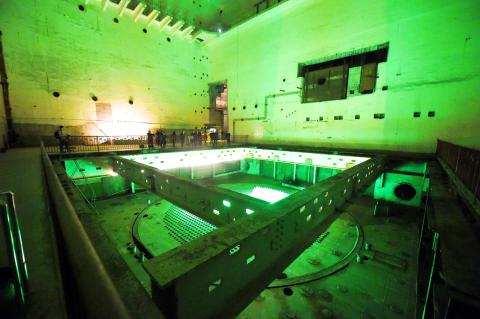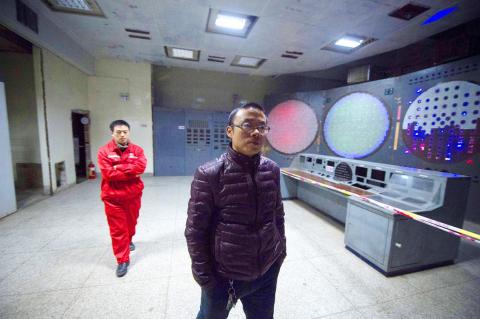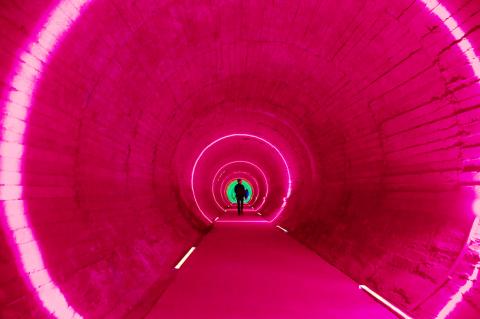It was a top-secret Chinese nuclear facility with a deadly Cold War mission — to make plutonium for an atomic bomb — but these days its doors are wide open as a tourist attraction.
The cavernous 816 Nuclear Military Engineering installation was burrowed into lush green mountains in southwest China over a 17-year span by 60,000 soldiers toiling day and night in dangerous conditions.
Construction on the vast site began in 1967, three years after China successfully tested its first atomic weapon, as China hurried to catch its nuclear program up with that of Cold War rivals the US and what was then the Soviet Union.

Photo: AFP
Located in the huge Chinese municipality of Chongqing, it covers 100,000m2 — the equivalent of 14 football fields — and with a volume equal to 600 Olympic-sized pools.
It has the world’s largest known network of artificial tunnels, its maze-like corridors extending more than 20km.
Surrounded by darkness and damp concrete, visitors are transported back to the Cold War.

Photo: AFP
“It’s very impressive and mysterious,” said Pan Ya, a 30-something tourist from a nearby town who visited with her parents.
“They had heard about this place for a long time, but were never able to come in,” she said while gazing at the old reactor core, now decorated with fake plutonium bars colored a luminous green.
The facility cost 80 billion yuan (US$12 billion), but, ironically, no nuclear material ever passed through it due to a dramatic shift in developments above ground even as soldiers labored below.

Photo: AFP
China established diplomatic ties with the US in 1979 and, later, tension with the Soviet Union also eased. Although near completion, the site was judged to have no further use and was abandoned in 1984.
Declassified in 2002, it was opened to Chinese tourists in 2010 and began welcoming foreign visitors at the end of last year.
More than 300,000 Chinese tourists have since visited, while less than 100 foreigners had done so as of last month.
Just 10 percent of the corridors, massive halls and control rooms are open to the public, but visitors can view a light show projected upon a mammoth wall as music thunders, along with various exhibits, including a model of the first Chinese A-bomb.
“We’re not promoting nuclear weapons,” 816 manager Zheng Zhihong said. “Quite the opposite. I hope that one day the nuclear powers will say: ‘Stop, let’s all count to three and destroy our arsenals.’”
The facility’s rebirth as a tourist attraction comes as little comfort to the thousands of soldiers who endured hellish conditions in blasting out the site’s corridors and halls.
“A colleague would detonate the explosives. Then we’d dig away at the rock with a machine. It could have collapsed at any minute,” former soldier Chen Huaiwen, now 70, said.
Officially, 76 people died in the process, but tour guides and former workers insist that number is too low.
“We’d sleep several to a bed on straw mattresses,” Chen said. “It was a furnace in the summer and you wouldn’t get to sleep before 1am.”
“Armed police kept watch outside while we worked on the construction. It was top-secret, entry was forbidden. At the time, ordinary people in the area only knew there was some project, they did not know what was being worked on.”
The food was basic: rice and beans, with meat thrown in twice a week.
“Many got lung problems because of the dust and that was without taking into account the toxic emissions from explosives, the machine smoke and the foul air,” Chen said.
Tears welled up in the eyes of another former soldier who worked on 816, Li Gaoyun, as he viewed old photographs displayed in the tunnels. It was his first visit in 42 years.
Li said many of the ex-soldiers who toiled at 816 receive no pensions or welfare benefits, despite the enormous sacrifices they made for their country.
“A lot of the former workers have no pension, no social security. They don’t have enough to live on,” Li said. “They owe us that. We gave our blood, our sweat. And our youth.”

The military is to begin conscripting civilians next year, Cambodian Prime Minister Hun Manet said yesterday, citing rising tensions with Thailand as the reason for activating a long-dormant mandatory enlistment law. The Cambodian parliament in 2006 approved a law that would require all Cambodians aged 18 to 30 to serve in the military for 18 months, although it has never been enforced. Relations with Thailand have been tense since May, when a long-standing territorial dispute boiled over into cross-border clashes, killing one Cambodian soldier. “This episode of confrontation is a lesson for us and is an opportunity for us to review, assess and

The United States Federal Communications Commission said on Wednesday it plans to adopt rules to bar companies from connecting undersea submarine communication cables to the US that include Chinese technology or equipment. “We have seen submarine cable infrastructure threatened in recent years by foreign adversaries, like China,” FCC Chair Brendan Carr said in a statement. “We are therefore taking action here to guard our submarine cables against foreign adversary ownership, and access as well as cyber and physical threats.” The United States has for years expressed concerns about China’s role in handling network traffic and the potential for espionage. The U.S. has

IDENTITY: A sex extortion scandal involving Thai monks has deeply shaken public trust in the clergy, with 11 monks implicated in financial misconduct Reverence for the saffron-robed Buddhist monkhood is deeply woven into Thai society, but a sex extortion scandal has besmirched the clergy and left the devout questioning their faith. Thai police this week arrested a woman accused of bedding at least 11 monks in breach of their vows of celibacy, before blackmailing them with thousands of secretly taken photos of their trysts. The monks are said to have paid nearly US$12 million, funneled out of their monasteries, funded by donations from laypeople hoping to increase their merit and prospects for reincarnation. The scandal provoked outrage over hypocrisy in the monkhood, concern that their status

A disillusioned Japanese electorate feeling the economic pinch goes to the polls today, as a right-wing party promoting a “Japanese first” agenda gains popularity, with fears over foreigners becoming a major election issue. Birthed on YouTube during the COVID-19 pandemic, spreading conspiracy theories about vaccinations and a cabal of global elites, the Sanseito Party has widened its appeal ahead of today’s upper house vote — railing against immigration and dragging rhetoric that was once confined to Japan’s political fringes into the mainstream. Polls show the party might only secure 10 to 15 of the 125 seats up for grabs, but it is